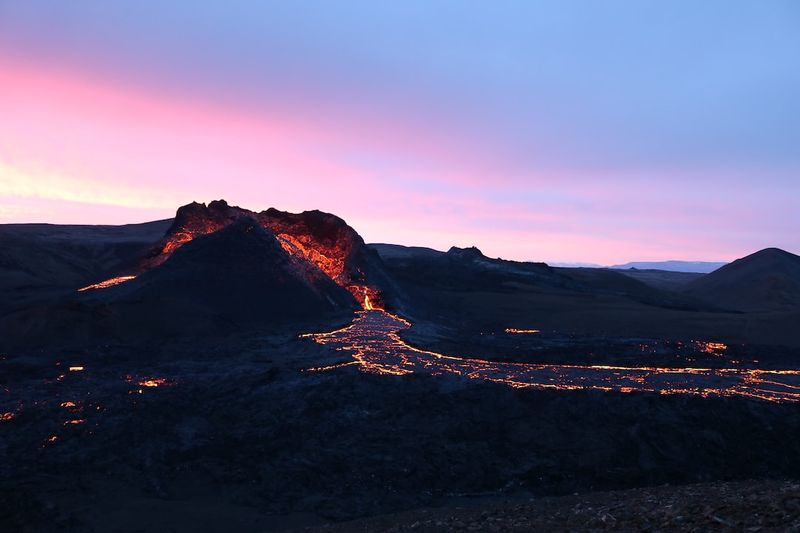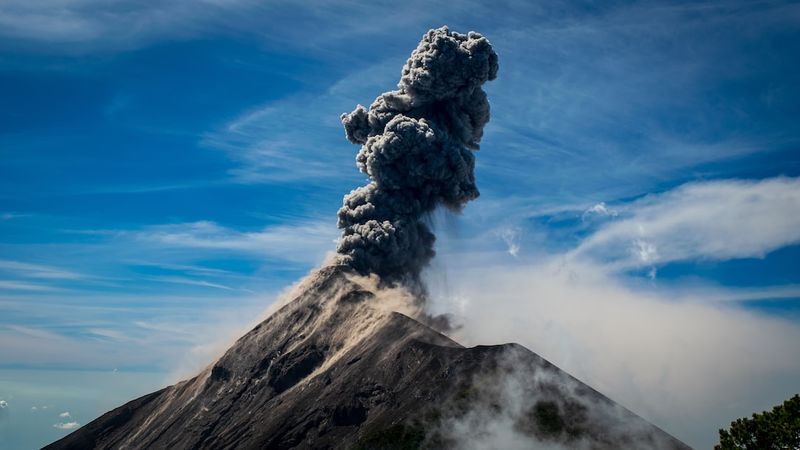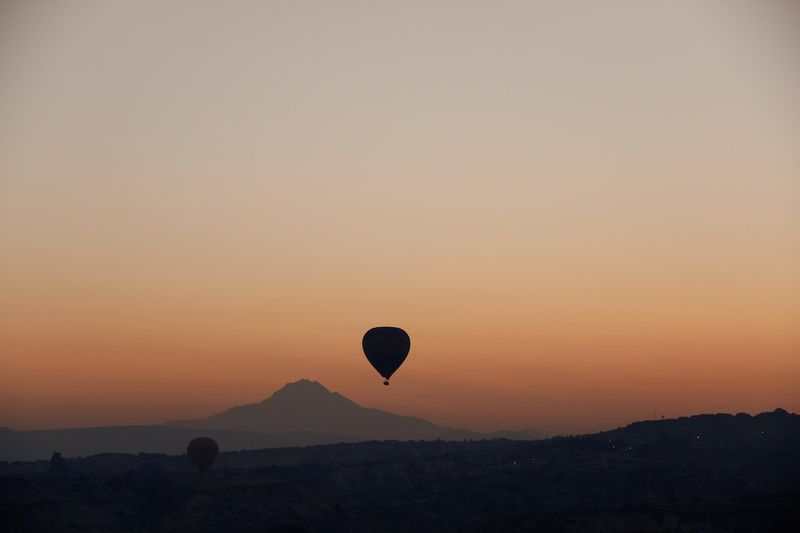Iceland Urges Tourists to ‘Stay Away’ as Volcanic Eruption Emits Toxic Gas
Authorities Issue Warning
Authorities in Iceland have issued a warning to tourists and spectators to stay away from an erupting volcano in the country’s southwest. The eruption began on Monday afternoon after a series of earthquakes in the area. The volcano, located in an uninhabited valley near the Litli-Hrutur mountain, is approximately 30 kilometers southwest of Reykjavik, the capital.
Previous Eruptions
This recent eruption comes just 11 months after the volcano’s last eruption officially ended. However, both the 2021 and 2022 eruptions did not cause any damage or disruptions to flights, despite the volcano’s proximity to Keflavik Airport, Iceland‘s international air traffic hub.
Potentially Dangerous Gas Emissions
The eruption has resulted in the release of potentially poisonous gas into the air. Residents in the nearby town of Reykjanes have been advised to stay indoors and keep their windows closed due to the risk of deadly toxic gas. Authorities have also urged tourists not to enter the area until conditions can be evaluated.
Expert Analysis
Dr. Robin Andrews, an expert in experimental volcanology, believes that this eruption is unlikely to lead to any disruptive ash clouds. He explained on Twitter that the fissure is quite a distance from any infrastructure and is expected to be a safely contained mid-size eruption. However, Dr. Andrews also noted that there is still much uncertainty surrounding the eruption in terms of volume, lava flow rate, potential additional fissures, and the eruption style.
Advice for Travelers
The UK Foreign Office has updated its advice for people traveling to Iceland, urging them to regularly check for updates from the Icelandic Met Office and other relevant authorities. Travelers are advised to monitor the situation closely and follow the guidance provided. The Department of Civil Protection and Emergency Management in Iceland will send out text messages to anyone located near the volcano in case of an emergency.
The Current Situation
As of Tuesday morning, scientists have observed that the fissure and the volume of the eruption have decreased. University of Iceland geophysics professor Magnus Tumi Guomundsson described it as a small eruption and stated that it is not expected to continue at the intensity seen in the first few hours. However, he also noted that the eruption could last for a significant period of time.
Editorial
Volcanic Activity in Iceland
Iceland, located above a volcanic hot spot in the North Atlantic, experiences eruptions on average every four to five years. These volcanic events have become a significant part of Iceland‘s natural landscape and attract both locals and tourists alike. However, while these eruptions can be a spectacular sight, they also pose risks and challenges that must be carefully addressed.
Protecting Public Safety
The recent eruption serves as a reminder of the importance of prioritizing public safety when volcanic activity occurs. Authorities in Iceland have taken swift action to warn both residents and tourists about the potential dangers associated with toxic gas emissions. It is crucial that everyone heeds these warnings and follows the advice provided in order to protect themselves and minimize the risk of harm.
The Role of Experts and Monitoring Agencies
Experts in volcanology play a critical role in analyzing and assessing volcanic activity, providing valuable insights and predictions. Their expertise is crucial in understanding the nature of eruptions and determining the level of risk posed. Monitoring agencies, such as the Icelandic Met Office, also play a vital role in tracking volcanic activity and issuing timely warnings. Their efforts are essential for ensuring the safety of the public and providing accurate information to travelers.
Learning from Past Events
Lessons can be learned from the Eyjafjallajökull eruption in 2010, which caused widespread disruption to air travel in Europe due to the release of volcanic ash. Since then, improvements have been made to volcanic ash detection and monitoring systems, allowing for more effective risk management. The experience garnered from past events aids not only in the development of better protocols for handling volcanic eruptions but also in educating the public about potential risks and necessary precautions.
Advice
Follow Official Guidance
It is essential for both residents and tourists to stay informed about the latest updates and guidance from local authorities and monitoring agencies. This includes regularly checking the Icelandic Met Office, Safe Travel, and Icelandic Road and Coastal Administration websites for updates on volcanic activity and following any instructions or advisories given.
Stay Away from Restricted Areas
In situations involving volcanic eruptions or potentially hazardous conditions, it is important to respect restricted areas and stay away from danger zones. This not only ensures personal safety but also allows emergency responders and scientists to assess the situation and provide necessary assistance.
Prepare for Changing Conditions
The volatile nature of volcanic activity means that conditions can change rapidly. Travelers should be prepared for unforeseen circumstances and be flexible with their plans. This includes having travel insurance that covers unforeseen events and keeping important emergency contact information readily available.
Take Note of Local Alerts
Travelers should be aware of local alert systems, such as text messages from the Department of Civil Protection and Emergency Management, that may provide critical information in emergency situations. These alerts can help ensure timely and appropriate responses to any evolving volcanic activity.
Respect the Environment
During volcanic eruptions, it is crucial to prioritize the protection of the environment. Visitors should follow any guidelines regarding responsible tourism and avoid causing any damage or disruption to natural habitats. Respecting the environment helps preserve Iceland‘s unique landscapes for future generations to enjoy.
In conclusion, the recent volcanic eruption in Iceland serves as a reminder of the inherent power and unpredictability of nature. While the eruption presents certain risks and challenges, effective communication, preparedness, and the adherence to official guidance can help ensure the safety of both residents and tourists. By staying informed, respecting restrictions, and taking necessary precautions, individuals can navigate these situations responsibly, with the ultimate goal of safeguarding lives and protecting the environment.

<< photo by Izabela Kraus >>
The image is for illustrative purposes only and does not depict the actual situation.
You might want to read !
- Exploring the Diverse Mustelid Species and Their UK Habitats
- Undercover in Horsham: Unveiling the Enigmatic Mustelids | Discovering England’s Best-Kept Secrets
- “Heated Match on and off the Court: John McEnroe Warned by BBC for Wimbledon ‘Sex’ Joke”
- Unleashing the Sizzle: Grab a Deal on the Ninja Air Fryer during Amazon Prime Day




